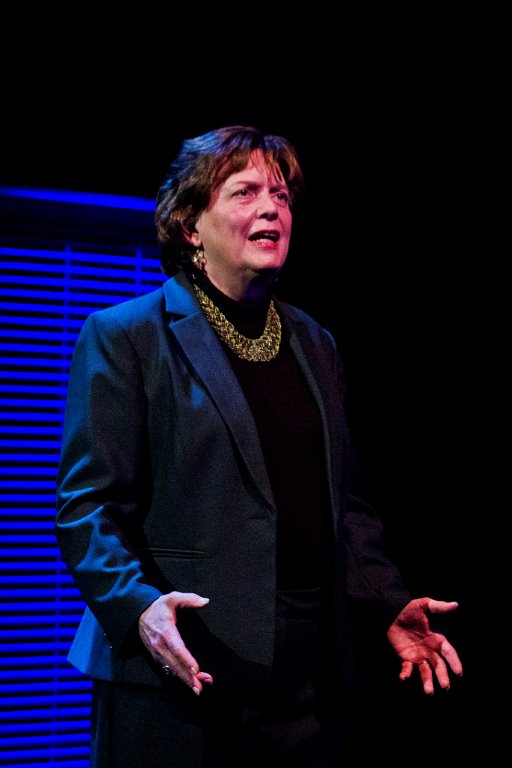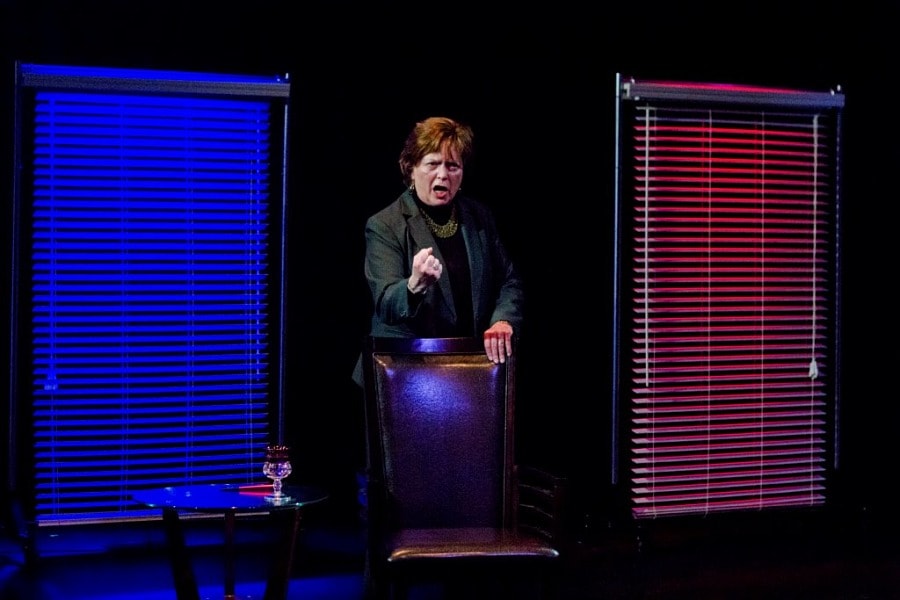CLEVELAND: The theatre has long been a safe haven for the LGBT community, on both sides of the proscenium arch. One reason is that the stage is often the first and frequently the only place to reflect, endorse or jumpstart social change. In fact, a new breed of plays about life in the LBGT community is slowly replacing the necessarily political and typically tragic plot points found in such groundbreaking 1980s and ’90s plays as The Normal Heart, Torch Song Trilogy and Angels in America.
Dramas like Geoffrey Nauffts’s Next Fall, for instance, simply place the everyday concerns of Americans in a queer context, while Alexi Kaye Campbell’s The Pride shows the contrast between life for gay men in the ’50s and today. Modern musicals like Kinky Boots serve to support the normalization of nontraditional gender identification—and do so with a candy coating.
Yes, things are changing. But not nearly fast enough for Christine Howey.
Howey is the clever, caustic, award-winning theatre critic for the Cleveland Scene, an alternative weekly newspaper based in northeast Ohio and one of the region’s go-to sources for quality arts journalism. She is also a former actor, published poet, competitive Poetry Slam participant and a transgender woman. With the 2013 workshop production of the play, now titled Exact Change and scheduled to run June 11–27 in Cleveland Public Theatre production at PlayhouseSquare, she is a produced playwright.
The autobiographical solo one-act, also performed by Howey and directed by Baldwin Wallace University professor Scott Plate, takes us on her arduous and often humorous transgender journey from Dick, a 45-year-old man with a wife and daughter, to Christine. It does so through her personal poetry and photographs, powerful prose, and dramatically simple staging. And it offers the perspectives of family, friends and a few helpful transvestites she meets along the way.
“I wanted the play to help create a different environment for transgender people and those elsewhere on the gender continuum,” says Howey. “For people to understand and feel positively towards us, they first have to see us. And that has always been a problem, since many who transition successfully then disappear into new genders and new identities.”

After the play was workshopped, it was booked for a three-week run at the Cleveland Public Theatre. Of her preparation for the performances, Howey jokes, “Sex reassignment surgery is terrifying, but try getting back onstage after 30 years! I was not only rusty as a stage performer but, as a well-known critic in town and with the unfortunate victims of my writing—actors, directors, designers—in the audience, there was no shortage of second-guessing the decision to ride the boards once more.”
But the response has been overwhelmingly positive—so much so that an expanded version of the play underwent trial performances at a nightclub in Provincetown, Mass., before having a critically acclaimed production at Akron’s intimate None Too Fragile Theatre several months ago.
That success is what led to the upcoming booking of Exact Change at downtown PlayhouseSquare, the nation’s second-largest theatre district, though it will be offered in the Helen Rosenfeld Lewis Bialosky Lab Theatre, one of the center’s “more intimate venues,” notes Gina Vernaci, PlayhouseSquare’s executive producer. The smaller space, she says, “allows us to showcase this truly provocative, courageous, and impactful work. And with the playwright onstage, it provides the audience with a uniquely personal, engaging experience.”
On the weekend of June 19-21, the show will be performed exclusively for TCG conference participants. In August, it will be part of the 2015 New York International Fringe Festival.
American Theatre sat down with the critic-turned-playwright to talk about her show.
BOB ABELMAN: The notorious life of British theatre critic Kenneth Tynan was the subject of a one-person play that premiered at the Royal Shakespeare Company in London in 2004. But unlike your play, Tynan didn’t write the piece, and he certainly didn’t perform in it.
CHRISTINE HOWEY: Well, he was dead, and, reportedly, not much of a performer when he wasn’t.
Playing yourself in your own play is tough enough, but you reveal so much about yourself in your 80 minutes onstage.
It is odd, since for many years I just wanted to live my life—my new life—and not call attention to it. But the continuing assaults on transgender people have bolstered my resolve to be a part of the solution. If telling my story, warts and all, is what is required then it is a small price to pay. Just recently, a 17-year-old transgender teen from Ohio committed suicide because he could find no acceptance within his family. I don’t want to read or hear about any more of those awful events.
While many critics believe that they can write a better play in their sleep than the ones they review for a living, very few—with The Saturday Review’s George Bernard Shaw, the New Republic’s Eric Bentley, and the Bristol Evening World’s Tom Stoppard being the most high-profile exceptions—have actually done so. Shaw wanted to write the plays he felt were missing from the contemporary theatre scene. Did your reviewing drive your writing Exact Change in any way?
I am deeply inspired and moved by much of the theatre I see, and being a lifelong writer I wanted to generate that kind of reaction in an audience. I’ve probably reviewed about 3,000 plays in the past 20 years, scribbling my notes in the dark. There is the urge to come into the light.
How does it feel having your work criticized by professional colleagues?
I am totally open to criticism, because I understand the vital role critics play in the process by recognizing established standards and holding productions accountable. I approach each play the same way I wish other critics would approach mine: Determine what the playwright is trying to do and then explain whether that goal was achieved.
There is greater visibility for trans people these days, from Orange Is the New Black to Transparent. From what you’ve seen, is the struggle to fit into or break out of a system of binary gender accurately reflected in these stories? Is it leading to greater understanding?
I believe that the transgender community is at a tipping point now in terms of public perception and understanding. This has come about, in part, because of shows like these, which feature flawed but relatable transgender characters. I think my show takes that progress a step further by telling a real story in the words of the person who lived it. That the production of Exact Change is taking place at a mainstream venue such as PlayhouseSquare sends a powerful message of recognition and inclusion, and for that I am truly grateful.
So, do you think that Exact Change can inspire social reform?
I think my play adds to the discussion.
Bob Abelman is the theatre critic for the Cleveland Jewish News and author of the recent Refereeing the Muses: An Arts Journalism/Theatre Criticism Primer (Peter Lang Publishing), which was reviewed in this publication.


